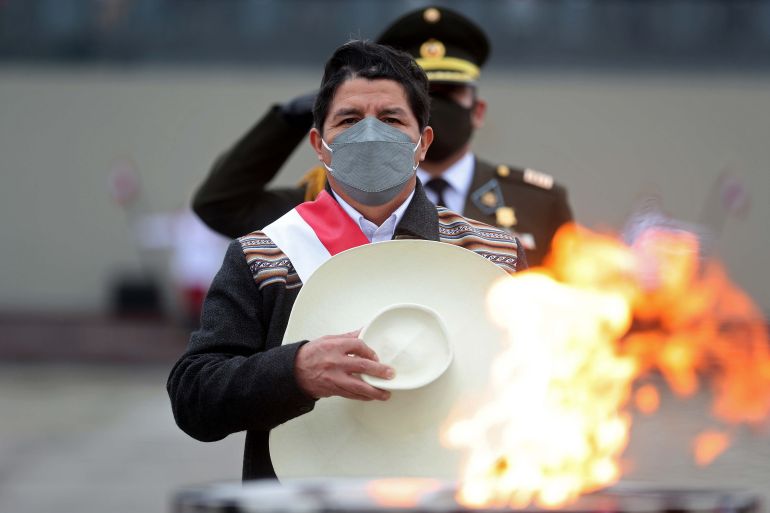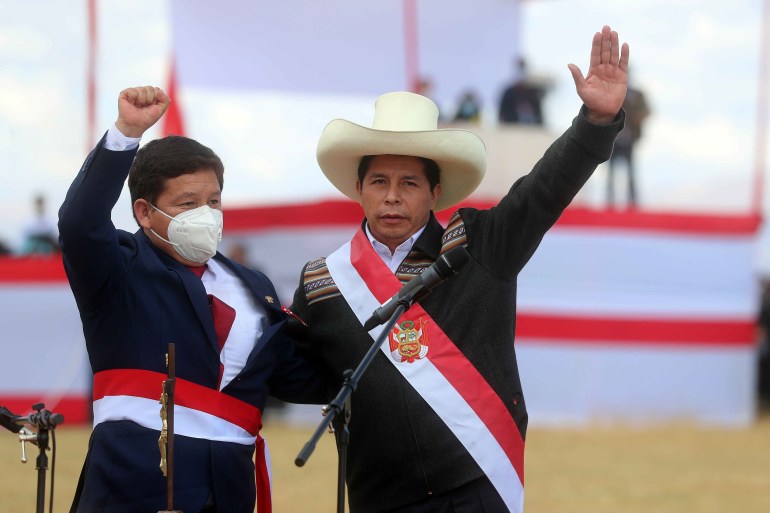A tumultuous first week in office for Peru’s new president
Pedro Castillo is facing political and economic turmoil – including calls for his impeachment – as he forms his administration.

Lima, Peru – Since winning Peru’s presidential runoff with an explicitly Marxist policy platform, Pedro Castillo has been at pains to assure citizens and investors alike that his government will be moderate and unifying.
“We are not Chavistas, we are not communists, we are not extremists,” he said shortly before being sworn in on July 28, as he sought to play down fears that his government would ravage Peru’s democracy and economy.
Keep reading
list of 3 itemsPeru protesters rally against Pedro Castillo’s new government
Peru’s Castillo faces major challenges as presidency begins
But since offering those assurances, the former rural school teacher and union leader, who refuses to criticise the Cuban and Venezuelan dictatorships, has endured a calamitous first week in office, which has seen the Peruvian Sol crash just as fears about his government’s true intentions skyrocket.
There have already been two marches in downtown Lima calling for the impeachment of Castillo, whose razor-thin election victory has been largely attributed to most Peruvians’ dislike of his corruption-tainted hard-right opponent, Keiko Fujimori, rather than any enthusiasm for the new president’s socialism.
Cabinet controversy
The first flashpoint was Castillo’s decision to name a cabinet largely made up of ideological hardliners from his Free Peru party, some of them with limited qualifications and linked to criminality. Some commentators view the move as a deliberate provocation aimed at pushing the Conservative-controlled Congress to vote down the cabinet. That could prompt a political crisis, giving Free Peru a pretext for an unconstitutional power grab.
The most controversial cabinet nomination is the new prime minister, Guido Bellido, who is currently the subject of a criminal investigation for “defending terrorism”. He is alleged to have made public comments and social media posts expressing support for Shining Path, the Maoists who slaughtered thousands, mainly impoverished villagers in the Andes and Amazon, in the 1980s and 90s.
As a result of that police probe, Bellido, who is also a member of the new Congress, is barred from sitting on congressional committees, including for defence and counter-narcotics, that have access to sensitive national intelligence. However, as prime minister, he will now be able to review those documents.
“Free Peru does not clearly state that its objective is a rupture with the democratic order but it idolises authoritarian leaders. Authoritarianism is in its DNA,” says Norma Correa, an anthropologist at the Pontifical Catholic University of Peru.
“Many people can’t forgive or forget the harm done by Shining Path. There is this extremely painful living memory. I would question this claim that Free Peru actually represents rural Peru.”

Bellido, 41, has also generated huge controversy for his flagrant homophobia, which has alienated some on Peru’s progressive left, which had, reluctantly, supported Castillo. In one 2019 tweet, the new prime minister eulogised former Cuban President Fidel Castro for warning that “fags” have no place in the revolution.
The backlash against Bellido was so swift and severe that the two most respected cabinet nominees, Pedro Francke, chosen for the economy ministry, and Aníbal Torres, selected as justice minister, baulked at being sworn in, sparking an embarrassing hours-long delay, all captured on live TV, to the other members of the new cabinet taking their oaths of office.
Eventually, after lengthy talks with Castillo, both Francke, a former World Bank economist, and Torres, a veteran lawyer with strong anti-corruption credentials, did take their oaths the following day. Francke notably did so pledging “equality of opportunities without distinction based on gender, ethnic identity or sexual orientation”.
Yet the pair remain outliers in Castillo’s new cabinet, most of whose members’ extreme politics, lack of qualifications and links with criminal activity have shocked many Peruvians.
The new defence minister, Walter Ayala, was once accused of human trafficking, it has emerged. Meanwhile, the transport minister used to run one of the informal bus companies whose fleet of poorly maintained, recklessly-driven vehicles help make Peru’s roads some of the most dangerous in the western hemisphere.
To make matters worse, Vladimir Cerron, the former regional governor who founded Free Peru but was barred from himself running for president by a corruption conviction, has been stoking fears that the new government is actually seeking to create a political crisis.
At some point in August, Congress will have to approve, or veto, the new cabinet. The vote will be part of a high-stakes chess game between the executive and the legislature.
‘Deepening polarisation’
If the government loses two congressional votes of confidence, the president can dissolve Congress and call new elections. But equally, Congress could swiftly impeach Castillo, as a significant minority of Peruvians are already demanding.
In a tweet this week, Cerron, who is widely viewed in Peru as controlling Castillo, declared the coming clash in Congress as being a “collision of two worlds, the European and Andean”, and, adopting Marxist jargon, the “subjective or objective.”
Richard Arce, a former congressman and one of the Peruvian left’s more outspoken critics of Free Peru, warned that the choice of the cabinet was a gift to the conservative opposition and risked triggering a premature end to Castillo’s presidency, dashing the hopes it had raised among Peru’s poorest citizens.
“It’s a political mistake. It’s deepening the polarisation and weakening our institutional framework, when we have had so many false claims of election fraud,” Arce said. “You’re giving an opportunity to coup-mongers, people who don’t respect democracy. It’s irresponsible.”
Since his inauguration, Castillo has largely eschewed public comments. A presidential spokesperson was unable to tell Al Jazeera when he would give his first media interviews or hold his first news conference as president.
He has also refused to work out of the presidential palace in downtown Lima, dismissing it as a “colonial” symbol. That prompted a storm of criticism as the new head-of-government worked out of a private office, lent to him in unexplained circumstances by a businessman supporter, with no official record of who he was meeting.
Hugo Nopo, a development economist with Lima’s GRADE think-tank, says it is impossible to tell whether the controversial cabinet choices were Castillo’s own idea, or whether he is being directed by Cerron.
“Everything is so opaque and secret,” says Nopo of the relationship between the president and his controversial adviser. “It’s impossible to know the real nature of their relationship.”
“Peruvian politics right now is like a jungle of monkeys with machine guns. The one good thing is that we are seeing some lawmakers calling for caution. They may have learned from the last Congress and will, hopefully, calculate better their actions.”